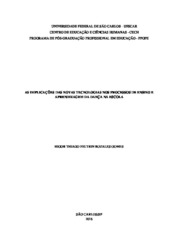| dc.contributor.author | Gomes, Higor Thiago Feltrin Rozales | |
| dc.date.accessioned | 2019-09-24T13:04:35Z | |
| dc.date.available | 2019-09-24T13:04:35Z | |
| dc.date.issued | 2018-12-18 | |
| dc.identifier.citation | GOMES, Higor Thiago Feltrin Rozales. As implicações das novas tecnologias nos processos de ensino e aprendizagem da dança na escola. 2018. Dissertação (Mestrado em Educação) – Universidade Federal de São Carlos, São Carlos, 2018. Disponível em: https://repositorio.ufscar.br/handle/ufscar/11879. | * |
| dc.identifier.uri | https://repositorio.ufscar.br/handle/ufscar/11879 | |
| dc.description.abstract | This study aims to analyze, discuss and investigate the influences and implications of the new technologies in the teaching and learning of dance, materialized in pedagogical practices in Physical Education and, specifically, to describe and analyze the use of technological resources as mediating tools and didactic processes in the teaching and learning of dance in Physical Education classes. The theoretical reference used was the cultural historical theory of Vygotsky; the studies of Adolfo Sánchez Vázques with the philosophy of praxis, as well as Agnes Heller who discusses the daily life and, besides these authors, Jenkins studies clarifies on the "transmediate narrative" and, MCLuhan adds in discussing technology as a human extension . The sample consisted of 21 teachers of Physical Education who are effective of the municipal education system of the city of Votuporanga-SP, city where the study was carried out. The instruments used for the data collection were: semi-structured questionnaire, semi-structured individual interview, observations and filming. The results of this study showed that the new technological trends are phenomena that need to be studied, since they are introduced in an indiscriminate manner, without proper educational intentions and are characterized as alien objects for many teachers who do not master the use of new technologies. The data point to the initial and continued formation as a determining factor in the positioning of teachers who do not use the new technologies as mediating tools of dance during the classes. In addition, there are still questions of prejudice and machismo that imply in the justification of some teachers who reported lack of affinity with the theme. The data also point to the relevance of continuing education in the workplace to address potential problems involving new technologies, dance and teacher training. | eng |
| dc.description.sponsorship | Não recebi financiamento | por |
| dc.language.iso | por | por |
| dc.publisher | Universidade Federal de São Carlos | por |
| dc.rights | Attribution-NonCommercial-NoDerivs 3.0 Brazil | * |
| dc.rights.uri | http://creativecommons.org/licenses/by-nc-nd/3.0/br/ | por |
| dc.subject | Educação física | por |
| dc.subject | Ensino e aprendizagem | por |
| dc.subject | Dança | por |
| dc.subject | Novas tecnologias | por |
| dc.subject | Physical education | eng |
| dc.subject | Teaching and learning | eng |
| dc.subject | Dance | eng |
| dc.subject | New technologies | eng |
| dc.title | As implicações das novas tecnologias nos processos de ensino e aprendizagem da dança na escola | por |
| dc.title.alternative | The implications of new technologies in the teaching and learning processes of dance at school | eng |
| dc.type | Dissertação | por |
| dc.contributor.advisor1 | Campos, Douglas Aparecido de | |
| dc.contributor.advisor1Lattes | http://lattes.cnpq.br/7847352503840983 | por |
| dc.description.resumo | O presente estudo tem como objetivo analisar, discutir e investigar as influências e implicações das novas tecnologias nos processos de ensino e aprendizagem da dança, materializados nas práticas pedagógicas em Educação Física e, especificamente, descrever e analisar o uso de recursos tecnológicos como ferramentas mediadoras e didáticas nos processos de ensino e aprendizagem da dança nas aulas de Educação Física. O referencial teórico utilizado foi a teoria histórico cultural de Vygotsky; os estudos de Adolfo Sánchez Vázques com a filosofia da práxis, assim como, Agnes Heller que discute sobre a cotidianidade e, além desses autores, os estudos de Jenkins esclarece sobre a “narrativa transmídia” e, MCLuhan agrega ao discutir a tecnologia como extensão humana. A amostra foi composta por 21 professores de Educação Física que são efetivos do sistema municipal de ensino da cidade de Votuporanga-SP, cidade onde o estudo foi realizado. Os instrumentos utilizados para a coleta de dados foram: questionário semiestruturado, entrevista individual semiestruturada, observações e filmagens. Os resultados deste estudo mostraram que as novas tendências tecnológicas são fenômenos que precisam ser estudados, pois são introduzidos de maneira indiscriminada, sem a intencionalidade adequada educacional e se caracterizam como objetos alienígenas para muitos professores que não dominam o uso das novas tecnologias. Os dados apontam a formação inicial e continuada como fator determinante no posicionamento de professores que não utilizam as novas tecnologias como ferramentas mediadoras da dança durante as aulas. Além disso, ainda existem questões de preconceito e machismo que implicam na justificava de alguns professores que relataram falta de afinidade com o tema. Os dados apontam ainda a relevância da formação continuada no próprio local de trabalho para sanar possíveis problemas que envolvem as novas tecnologias, a dança e a formação de professores. | por |
| dc.publisher.initials | UFSCar | por |
| dc.publisher.program | Programa de Pós-Graduação Profissional em Educação - PPGPE | por |
| dc.subject.cnpq | CIENCIAS HUMANAS::EDUCACAO::ENSINO-APRENDIZAGEM | por |
| dc.publisher.address | Câmpus São Carlos | por |
| dc.contributor.authorlattes | http://lattes.cnpq.br/0568510430278355 | por |


